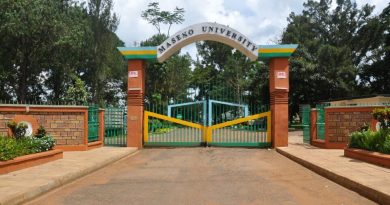Bachelor of Science in Electrical and Electronic Engineering At Dedan Kimathi University Of Technology
The Bachelor of Science (BSc) in Electrical and Electronic Engineering at Dedan Kimathi University of Technology (DeKUT) is an undergraduate degree program that focuses on the study and application of electrical systems, electronic devices, and communication technologies. This field plays a crucial role in developing, designing, and maintaining a wide range of electrical and electronic systems, including power generation and distribution, telecommunications, control systems, and electronic devices.
Qualifications to study Bachelor of Science in Electrical and Electronic Engineering course at Dedan Kimathi University
To study a Bachelor of Science in Electrical and Electronic Engineering Program at Dedan Kimathi University one must meet the following requirement. KCSE applicants: Mean Grade C+ and Mathematics C+, Physics C+, Chemistry C+ or equivalent qualifications obtained in other examination systems recognized by the University Senate.
Mode Of Study
Main Campus
Full time: 5 years
About Bachelor of Science in Electrical and Electronic Engineering Program at Dedan Kimathi University Of Technology
The curriculum of a BSc in Electrical and Electronic Engineering at Dedan Kimathi University of Technology (DeKUT) is designed to provide students with a solid foundation in mathematics, physics, and engineering principles. Students typically study subjects such as circuit analysis, electronic devices and circuits, digital systems, electromagnetic theory, control systems, signal processing, power systems, and communication systems. They also learn about computer programming, software tools, and engineering ethics.
Throughout their studies, students engage in laboratory work, design projects, and practical experiments to gain hands-on experience and develop skills in designing, building, and testing electrical and electronic systems. They work with tools and equipment commonly used in the industry, such as oscilloscopes, signal generators, microcontrollers, and simulation software, to understand the behavior and performance of electrical and electronic circuits and systems.
In addition to the core electrical and electronic engineering courses, students often have the opportunity to specialize in specific areas of interest, such as power systems, telecommunications, control systems, or embedded systems. These specializations allow students to focus their studies and gain in-depth knowledge and expertise in a particular subfield of electrical and electronic engineering.
The BSc in Electrical and Electronic Engineering program typically takes five years to complete. During their studies, students may also have opportunities for internships or co-op programs, which provide practical work experience in industries related to electrical and electronic engineering. These experiences not only enhance students’ understanding of the field but also often lead to job offers upon graduation.
Upon successfully completing the BSc in Electrical and Electronic Engineering at Dedan Kimathi University of Technology (DeKUT), graduates have a wide range of career opportunities available to them. They can work as electrical engineers, electronics engineers, telecommunications engineers, control systems engineers, or power systems engineers in various industries, including telecommunications, power generation and distribution, electronics manufacturing, automation, and renewable energy. They can be involved in designing and developing electrical systems, electronic devices, communication networks, control systems, or renewable energy systems.
Electrical and electronic engineering is a field that drives technological advancements and innovation in various sectors. It is instrumental in developing solutions for clean energy generation, improving communication networks, designing advanced electronics, and optimizing industrial processes. A BSc in Electrical and Electronic Engineering equips students with the knowledge, skills, and practical experience necessary to contribute to these advancements and shape the future of electrical and electronic systems.
Dedan Kimathi University Application Process
Application forms can be obtained from Dedan Kimathi University of Technology Main Campus and Nairobi Campus or downloaded from the University website www.dkut.ac.ke. One can submit dully filled application forms or apply online from the university website https://www.dkut.ac.ke/index.php/academics/admission/apply-online, upon payment of a non-refundable application fee of Ksh.3, 000 for PhD, Ksh.1, 500 for Masters,Ksh.1, 000, for Undergraduate Degree, Ksh 500/- for Diploma and Certificate Programmes to any of the bank accounts on the application forms.
Registrar (Academic Affairs)
P.O. Box 657 – 10100 Nyeri
Tel: 061- 2050000
Registrar AA office: 0713 835 965 registraraa@dkut.ac.ke
Nairobi Campus: 0710-127516 directornairobi@dkut.ac.ke
Marketing office: 0713-123021 marketing@dkut.ac.ke
Bachelor of Science in Mechanical Engineering At Dedan Kimathi University Of Technology
Bachelor of Science in Mechatronic Engineering At Dedan Kimathi University Of Technology
Bachelor of Science in Civil Engineering At Dedan Kimathi University Of Technology
Bachelor of Science in Chemical Engineering At Dedan Kimathi University Of Technology




